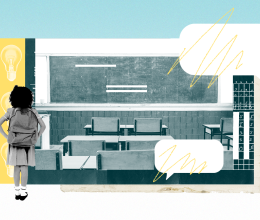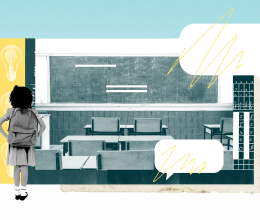
Andy was born in Nampa, Idaho. Both of his parents are from Sinaloa, Mexico and moved to Idaho in the 90s. Andy attended schools in the Boise Independent School District, including Whitney Elementary, South Junior High, and Boise Senior High School.
Some of Andy’s schools offered a dual immersion program. Through this program, Andy continued to learn his family’s native language, Spanish, and Latin American history. As Andy shared, this helped him grow and maintain his Latino identity, culture, and heritage.
Andy is now a student at the College of Western Idaho, where he is majoring in political science.
*The following interview has been edited for clarity.
What was your experience like in Boise Independent School District’s dual immersion program?
I was one of the first students to be a part of [Whitney Elementary’s] dual language program. Through this program, they offered classes in Spanish and in English. This definitely helped a lot to maintain my identity, and who I was, and helped me grow up in a setting where I was not forced, but I was pushed to speak Spanish and to learn concepts in Spanish. I thought that was really cool because, especially this far up north, it’s very difficult to maintain that culture, that heritage, and that aspect of the language. And to me it was important to maintain it.
At South Junior High and Boise Senior High, the dual language program was not as present, but there were still some Spanish classes that I took. And they still talked about the different aspects of Latin American culture. But I think I would have preferred learning more about my home country and Latin America as a whole. I think the programs did the best they could because they were relatively new.
Did you ever experience discrimination in your schools in Boise?
I don’t think so, but I do recognize that this has been an issue that some people face in the United States, especially my parents, as well. They would always tell me stories about mistreatment and how they were treated in the states as Latinos. So, they would tell me to be careful.
In Idaho, a lot of Latinos, Chicanos, and Hispanics in general are the target of a lot of political conversations, like immigration. The high school I went to was more right-leaning, Republican, and there were Trump flags everywhere. And our school had a decent-sized Latino population. But I would interact with people who had beliefs that Latinos and Hispanics should not be present at that school. No one ever directed these comments at me, but I knew their beliefs on immigration and towards the Latino community.
Why was it important to maintain your ethnic identity in your education?
I identify as Latino, Hispanic, and Chicano. Being a Chicano is very important to my identity growing up in the states because it has been difficult to maintain that Mexican identity. My parents wanted to ensure that I kept this identity because we were so far away from our homeland. So, I have always thought about whether I could speak Spanish, or whether I could navigate Latin American society. Because I grew up in a place that integrated so much American society that I felt an uphill battle to keep my own identity.
What does Brown Pride mean to you?
To me Brown Pride means being happy or proud of who you are and where you are from, in this case, Brown people, and people from Latin American countries. And it’s about holding on to that culture and making sure you don’t lose it. It’s showcasing to the world who you are. I think Brown Pride is very important in today’s society because it allows us to keep our cultures alive and it also allows us to make sure we are being treated equally.
What do you think schools in Idaho should be doing to better support Latinx students?
I think Latino students are already kind of marginalized with the current political issues that are happening. And I know it can be difficult in a state like Idaho, where there are so many negative beliefs against immigrants, to challenge those beliefs. But I feel like if the school system understands what Latino students face that could be a huge step towards supporting them. Schools need to ensure that Latino students get the most of their education by recognizing the issues that students face.
The Education Equity for Latinx Students project started in the fall of 2022 as part of our efforts to expand racial justice work on behalf of Idaho students, beginning with Latinx communities.
READ MORE STORIES AND LEARN ABOUT THE EDUCATION EQUITY FOR LATINX PROJECT
